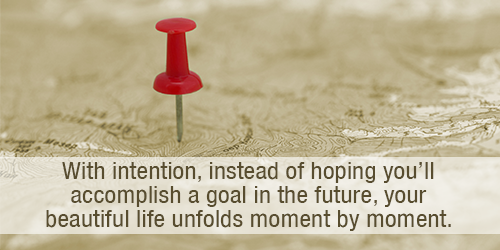Whether you call them goals or New Year’s resolutions, without having a clear intention, setting goals may keep you focused on a future outcome rather than living fully in the present moment. The differences between goals and intentions makes all the difference in the world!
Realizing the differences between goals and intentions
I’ve written at least a half dozen articles and one book chapter about successful goal setting. Moreover, my own life seemingly unfolded one goal at a time: medical school, medical practice, starting my company, writing my first book, and so on.
Not surprisingly, I dieted the same way. My goals kept me hoping for some future outcome that would make me happy, rather than appreciating the present moment where all decisions are made.
Setting goals and having intentions are not mutually exclusive, so realizing the differences between goals and intentions is valuable for optimal well-being.
It’s the journey, not just the destination
 The trite but true saying, “It’s the journey, not just the destination,” summarizes the limitations of goals. Without having a guiding intention, a goal keeps you focused on doing with the expectation of some reward, acknowledgement, or happiness when you cross the finish line.
The trite but true saying, “It’s the journey, not just the destination,” summarizes the limitations of goals. Without having a guiding intention, a goal keeps you focused on doing with the expectation of some reward, acknowledgement, or happiness when you cross the finish line.
On the other hand, intention setting is the practice of living in alignment with your values now. Your focus is on being based on the internal state you wish to create.
With your intention in mind, you have the flexibility to adapt to the ever-changing present moment. When inevitable obstacles and opportunities present themselves, your intention guides your attitude and actions based on your principles. Unlike hoping you’ll accomplish a goal you’ll celebrate (or cross off) in the future, your beautiful life unfolds moment by moment.
The road to health is paved with good intentions
The connection to mindful eating is probably obvious, but let’s explore this further.
When you set a goal like losing 20 pounds, lowering your blood pressure, or getting off your diabetes medication, your “success” is based on an external result that’s off in the future, and may or may not actually happen due to numerous factors beyond your control. In the meantime, temptations are everywhere, so to stay on course, you muster your willpower and fixate on the future. If you do accomplish the goal, the satisfaction is often temporary and your new goal becomes “maintenance”—hardly inspiring. If your goal is not achieved despite your best effort, you feel discouraged, disappointed, or even ashamed. You are likely to “quit” your diet and/or exercise program, only to set another goal when you feel bad enough.
Instead, when your intention is to eat mindfully in order to feel good now, you make conscious decisions about when, what, how, and how much to eat by weighing all your available options. Your awareness of your physical sensations, your thoughts, and your feelings provide continuous feedback about how close you are to your intention.
When (not if) you overdo it, your body lets you know. Without judgment, you learn from your necessary mistakes and make continuous adjustments based on the intrinsic “reward” of feeling good now.
Finding the balance between goals and intentions
Don’t get me wrong. Effective goal setting is a valuable skill that may help you take the necessary steps to achieve a desired result in the future. And there’s nothing wrong with that… unless it causes you to miss out on now.
As my experience with mindfulness evolves, I realize that achieving my goals is only a small part of creating a life I love. My intention to live fully and vibrantly makes that life a daily reality.
This article was updated from a previously published version.
Want more tips for setting your intention to eat and live mindfully?
Why a New Year’s Resolution to Lose Weight Doesn’t Work
Six Surprisingly Small New Year’s Resolutions that Lead to Big Changes
How to accept yourself as you are right now


